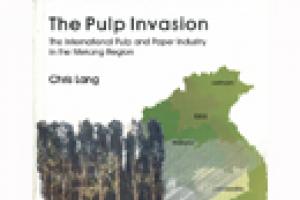Lead mines are killing ethnic communities and contaminating water sources in the Thung Yai Naresuan Wildlife Sanctuary complex, a World Heritage site, in eastern Thailand.
Thailand
Bulletin articles
3 May 2003
Advance Agro, one of Thailand's largest pulp and paper companies, markets its "Double A" brand paper as environmentally friendly. The company's advertising explains that the raw material comes from plantations and thus relieves pressure on remaining forest areas.
Bulletin articles
4 March 2003
The purpose of British colonial forestry in the nineteenth century was to ensure that the colonial state maintained control over the forests in order to ensure a steady supply of timber. The imprint of colonial forestry in the Mekong Region is still felt today, as states continue to wrest control of forests from local communities.
Bulletin articles
4 March 2003
The planned Nam Theun 2 (NT2) dam on the Nakai Plateau in central Lao People's Democratic Republic would be 48 m high and 320 m long, with a capacity of about 1000 megawatts. It would create a 450 km2 reservoir with volume of 3 billion cubic meters. Water from the reservoir would be driven through 40 km long tunnels to a powerhouse located at the base of the Nakai plateau on the Xe Ban Fai River. The size of the project and its location will have a substantial impact on regional biodiversity and people.
Bulletin articles
11 February 2003
First commissioned in 1964, the World-Bank funded Bhumiphol dam in Tak province, north west Thailand, has never operated to its full capacity. In March 1994, the reservoirs behind the Bhumiphol and Sirikit dams (both World Bank-funded) contained only 7 per cent of their total usable volume. The Thai government's answer is to propose yet more dams on the Salween River, on the Thai-Burma border in order to divert water into the Bhumiphol reservoir.
Publications
9 December 2002
This report was produced in 2000-2001 for the World Rainforest Movement, looking at the current state of the pulp and paper industry in the Mekong Region: Thailand, Laos, Cambodia and Vietnam. The research covers the extent of plantations and their social and environmental impacts in the region, the role of the various institutions in supporting the expansion of industrial plantations, and the patterns of local resistance to ecological damage and loss of livelihood.
Bulletin articles
7 November 2002
In June 2001, two teak plantations managed by Thailand's Forest Industry Organisation (FIO) were awarded a certificate as "well managed" under the Forest Stewardship Council (FSC) system. The plantations, at Thong Pha Phum and Khao Krayang, were assessed by SmartWood, a non-profit organisation run by Rainforest Alliance, a US-based NGO.
Other information
7 October 2002
More than ten years of negotiations between government officials, local community groups and non-governmental organisations (NGOs) have led to a draft community forest bill which would be Thailand’s first legislation recognising the legal status of communities living in and around Thailand’s National Forest Reserves to use, manage and protect their forests in co-operation with the Royal Forestry Department.
Bulletin articles
12 July 2002
The upland forests of north Thailand have become an arena for intensely contested perspectives on forest protection as state forestry officials and some nature conservation groups attempt, in the name of forest conservation, to remove local communities, particularly hilltribe people living in and using these forest areas, with the argument that upland forests act as watersheds for lowland rivers and must therefore be kept free of human interaction.
Bulletin articles
14 May 2002
Over the last decade the area of fast-growing tree plantations in the Mekong region has expanded dramatically. Villagers throughout the region have seen their forests, fallows and grazing lands replaced with eucalyptus, acacia and pine monocultures. A new World Rainforest Movement report, "The Pulp Invasion: The international pulp and paper industry in the Mekong Region", written by Chris Lang, gives an overview of the industry, profiles the actors involved and documents the resistance to the spread of plantations.
Bulletin articles
15 April 2002
Thailand’s Upper House of Parliament or Senate recently blocked the passage of the draft Community Forest Bill and proposed amendments that would prevent local people having a greater role in managing Thailand’s forests and ultimately lead to the eviction of thousands of forest-dwelling communities.
The draft bill was approved by a majority of Members of Parliament (MP) in the Lower House earlier last year. But the senate amendments have forced the draft bill back to the Lower House for review by a committee comprising members of both the Upper and Lower Houses of Parliament.
Bulletin articles
15 April 2002
Under pressure from Thai civil society groups, the Thai government rejected a "forest conservation" proposal by the United States (US) that would establish tree plantations to meet the US targets for reducing carbon dioxide (CO2) emissions in return for reducing debt owed by Thailand to the US.

